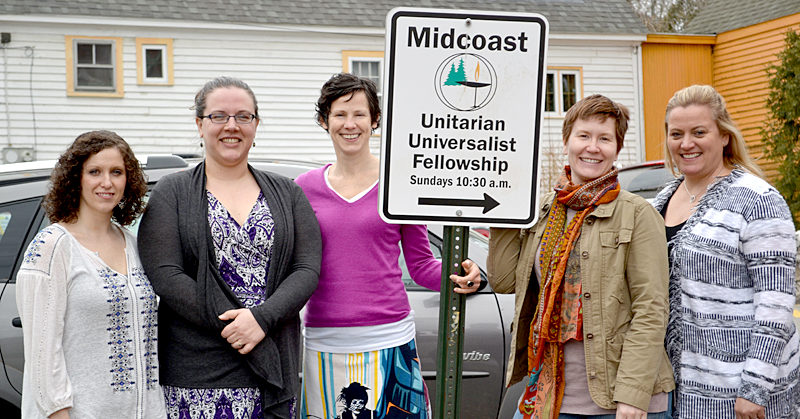
6 From left: Midcoast Unitarian Universalist Fellowship members Tiffany Vencile, Caity Bogdan, Rev. Erika Hewitt, Courtney Belolan, and Rosie Davis outside their meeting location at the Skidompha Library on Saturday, April 8. (Abigail Adams photo)
To celebrate Easter on Sunday, April 16, members of the Damariscotta-based Midcoast Unitarian Universalist Fellowship will receive envelopes of cash to distribute in a way “that lifts us all up,” said the Rev. Erika Hewitt, the fellowship’s minister.
The fellowship will distribute 20 envelopes with $100, $50, $20, and $10 bills to members willing to accept the challenge of using the money to benefit humanity, Hewitt said. The “reverse offering” has become a tradition among Unitarian Universalist congregations, and is in its second year in the Midcoast.
Through the practice, members embody the Unitarian Universalist belief “that we are all agents of kindness, love, and justice in the world,” Hewitt said. In its first year, the reverse offering provoked “big questions” and a lot of self-reflection from participants, she said.
During her Easter sermon in 2016, Hewitt asked those in attendance who would commit to performing an act of kindness and love. There was no mention of money, but those who stood up received the envelopes.
The practice was initiated on Easter Sunday to celebrate the essence of the holiday for Unitarian Universalists, Hewitt said. For many Christian denominations, Easter is about the good news of the physical resurrection of Jesus Christ.
“In our theology, the good news is about the connection” of the global community and “belonging to one another,” Hewitt said.
Through 20 people, $600, broken into small amounts, filtered into the world.
The challenge to make the world a better place with a small amount of money provoked deep thoughts for participants, Hewitt said. “I heard from a lot of people who said they felt a little paralyzed,” she said.
The self-reflection among participants is as much the purpose of the reverse offering as using it to benefit the outside world, Hewitt said. “We’re a faith that really asks our members to sit with big questions and work out the meaning for themselves,” she said.
One woman received an envelope with $10 and questioned how such a small amount of money could be used in a meaningful way. The woman then thought back to a time in her life when $10 was a lot of money, Hewitt said.
“She was able to reflect on her own life,” Hewitt said. “It was a lesson in gratitude and privilege.”
Caity Bogdan also received an envelope with $10, and had similar questions about how to use it to make a difference. Bogdan often travels into Boston, where she frequently encounters homeless panhandlers, she said.
Bogdan struggles with the question of whether to give panhandlers money, especially after experiences when she has offered food instead of money, and has had the offer rejected, she said.
Those experiences reinforced the common assumption that panhandlers collect money for “the usual list of booze and drugs,” Bogdan said in an email to Hewitt describing how she used the money.
The reverse offering was an opportunity to overcome those judgments and assumptions, Bogdan said. “Maybe I just need to decide when I have money to give I will just give what I have and relinquish the right to decide what they do with it,” Bogdan said in the email.
On her next trip to Boston, Bogdan gave the $10 to the first person she saw begging at the North Station. “I decided to let go and not judge how they were going to use the money,” Bogdan said.
Rosie Davis received $50 in her envelope. “I immediately felt this huge responsibility,” Davis said. She matched the $50 with her personal funds, and looked for a local charity where $100 would make a difference.
The Lincoln Academy Special Olympics Team could not afford jackets that year, Davis said. She donated the money to them.
Tiffany Vencile received $100 and gave it to the Knox Adopt a Backpack program, which helps feed hungry children in Knox County and Waldoboro. A former Waldoboro resident, she saw a pressing need for the program in the community and wanted to help battle food insecurity.
Through the Christmas Eve offering and the donations of leaders, $500 was collected for this year’s reverse-offering, Hewitt said. On Easter Sunday, 20 people will take on the challenge of using the money to spread love and kindness in the world.
Easter will mark Vencile’s third year with the Midcoast Unitarian Universalist Fellowship. Raised Baptist and Methodist, Vencile said she did not connect to the Easter message she heard growing up about the physical resurrection of Jesus Christ.
The Easter sermon Vencile heard from Hewitt three years ago focused on people’s responses to a question about the lowest point in their life. “It was about real life and helping each other in the here and now,” Vencile said.
The reverse offering to celebrate Easter is another example of that, Vencile said. It’s “a way to build each other up,” she said.






